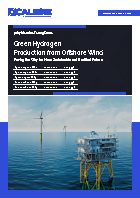| Date | Venue | Fee | |
|---|---|---|---|
| 08 Jun - 12 Jun 2026 | Dubai – UAE | $ 5,950 | Register Now |
| 07 Sep - 11 Sep 2026 | London - UK | $ 5,950 | Register Now |
| 07 Dec - 11 Dec 2026 | Dubai – UAE | $ 5,950 | Register Now |
About the Course
Integrating green hydrogen production with offshore wind energy represents a groundbreaking advancement in the quest for sustainable energy solutions. Green hydrogen, produced using renewable energy sources like offshore wind, offers a clean and versatile fuel alternative that can significantly reduce carbon emissions across various sectors, including transportation, industry, and power generation. As nations worldwide strive to meet ambitious climate targets, the synergy between offshore wind farms and hydrogen production emerges as a critical component in the transition to a low-carbon economy.
This 5-day Green Hydrogen Production from Offshore Wind training course is designed to equip delegates with the essential knowledge and skills needed to harness the full potential of this innovative energy pairing. Delegates will explore the complexities of offshore wind energy and hydrogen production, exploring the technological, economic, and regulatory dimensions underpinning their successful integration. By understanding the intricacies of these systems, they will be better positioned to contribute to developing and implementing green hydrogen projects that capitalise on the abundant offshore wind resources.
As the global energy landscape evolves, the importance of multidisciplinary expertise becomes increasingly evident. This training program addresses the critical need for professionals who can navigate the technical challenges, financial considerations, and policy frameworks associated with green hydrogen and offshore wind projects. Delegates will gain insights into the latest advancements and best practices, ensuring they are well-prepared to drive forward sustainable energy initiatives. By fostering a deep understanding of the interplay between offshore wind and green hydrogen production, it aims to empower delegates to become leaders in the clean energy transition, paving the way for a more sustainable and resilient future.
Core Objectives
By the end of the training course, delegates will be able to:
- Develop a thorough understanding of the integration of offshore wind energy with green hydrogen production
- Acquire technical skills related to the design, implementation, and optimisation of offshore wind farms and hydrogen production systems
- Learn to conduct economic viability assessments and financial modeling for green hydrogen projects
- Gain insights into the regulatory frameworks, compliance requirements, and policy incentives that govern green hydrogen and offshore wind projects
- Understand the environmental and social implications of green hydrogen production from offshore wind, and learn to conduct impact assessments and engage stakeholders effectively to ensure project success and community acceptance
Training Approach
This training course combines interactive lectures, hands-on workshops, and simulation exercises to provide delegates with practical experience and deep insights into the integration of offshore wind and green hydrogen production. Emphasis is placed on collaborative learning, real-world problem-solving, and expert-led discussions to ensure participants can effectively apply their knowledge to drive sustainable energy projects.
The Attendees
It will be valuable to the professionals but not limited to the following:
- Energy Managers and Analysts
- Renewable Energy Project Managers
- Offshore Wind Farm Engineers
- Hydrogen Production Engineers
- Energy Policy Makers and Regulators
- Environmental Consultants
- Energy Analysts and Economists
- Utility and Grid Operators
- Sustainability and Environmental Managers
- Technical Consultants in Energy and Utilities
- Marine and Offshore Engineers
Daily Discussion
DAY ONE: OVERVIEW OF GREEN HYDROGEN PRODUCTION AND OFFSHORE WIND
- Definition and Significance of Green Hydrogen
- Benefits of Offshore Wind Energy
- Synergies between Offshore Wind and Hydrogen Production
- Technical Potential of Offshore Wind for Hydrogen Production
- Offshore Wind Farm Components and Technologies
- Hydrogen Production Methods (Focus on Electrolysis)
- Key Stakeholders and Their Roles
- Environmental and Ecological Considerations
- Economic Implications and Opportunities
- Current Global Landscape of Green Hydrogen from Offshore Wind
DAY TWO: TECHNICAL ASPECTS OF OFFSHORE WIND FARMS
- Site Selection Criteria for Offshore Wind Farms
- Wind Resource Assessment and Measurement
- Turbine Technology and Design
- Foundations and Substructures
- Installation and Commissioning Processes
- Operation and Maintenance Strategies
- Grid Connection and Integration
- Offshore Wind Farm Lifecycle
- Challenges in Offshore Wind Deployment
- Technological Innovations and Advancements in Offshore Wind
DAY THREE: HYDROGEN PRODUCTION TECHNOLOGIES AND INFRASTRUCTURE
- Electrolyzer Technologies (PEM, Alkaline, Solid Oxide)
- Hydrogen Production Efficiency and Optimisation
- Integration of Electrolyzers with Offshore Wind Farms
- Hydrogen Storage Solutions and Technologies
- Hydrogen Transportation and Distribution Infrastructure
- Safety and Risk Management in Hydrogen Production
- Regulatory and Permitting Requirements
- Water Resource Management for Electrolysis
- Hydrogen Purity Standards and Requirements
- Innovations in Hydrogen Production Technologies
DAY FOUR: ECONOMIC AND FINANCIAL ANALYSIS OF GREEN HYDROGEN PROJECTS
- Capital and Operational Cost Breakdown
- Revenue Streams and Economic Benefits
- Financial Modeling Techniques for Hydrogen Projects
- Risk Assessment and Mitigation Strategies
- Funding and Financing Options
- Policy Incentives and Subsidies
- Market Analysis and Demand Forecasting
- Cost Reduction Strategies
- Project Development Timelines and Milestones
- Business Models and Commercial Strategies
DAY FIVE: GOVERNANCE, COMPLIANCE, AND SOCIETAL IMPACT
- Regulatory Frameworks and Compliance Requirements
- Environmental Impact Assessment and Mitigation
- Social Acceptance and Community Engagement
- Legal and Ethical Considerations
- Stakeholder Management and Collaboration
- International Policies and Agreements
- Sustainability and Lifecycle Analysis
- Public and Private Sector Roles and Responsibilities
- Education and Workforce Development
- Building a Sustainable Hydrogen Economy
Certificate Awarded
Upon successful completion of this training course, participants will be awarded a Certificate of Completion from XCalibre Training Centre, acknowledging their accomplishment. This certificate serves as a testament to their dedication to developing their skills and advancing their expertise in their respective fields.



